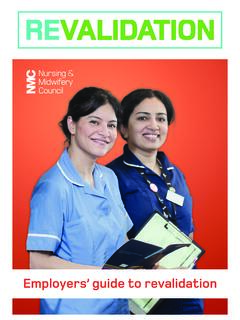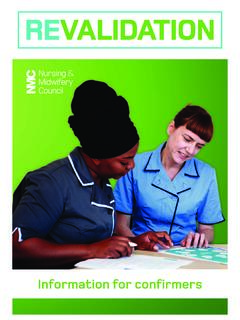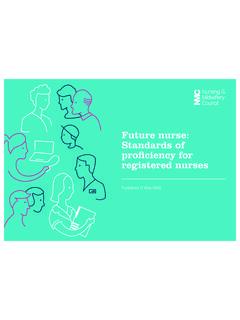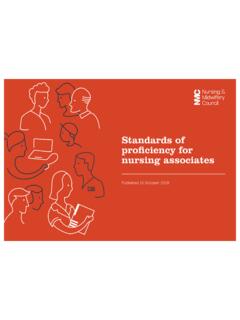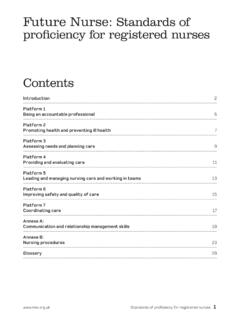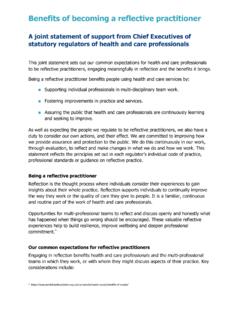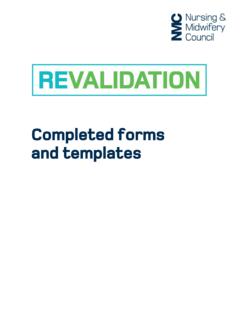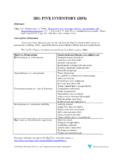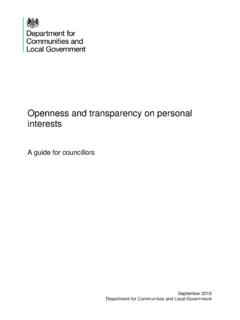Transcription of Openness and honesty when things go wrong
1 1 Openness and honesty when things go wrong : the professional duty of candourThe professional duty of candourEvery health and care professional must be open and honest with patients and people in their care when something that goes wrong with their treatment or care causes, or has the potential to cause, harm or This means that health and care professionals must: tell the person (or, where appropriate, their advocate, carer or family) when something has gone wrong apologise to the person (or, where appropriate, their advocate, carer or family) offer an appropriate remedy or support to put matters right (if possible) explain fully to the person (or, where appropriate, their advocate, carer or family) the short and long term effects of what has and care professionals must also be open and honest with their colleagues, employers and relevant organisations, and take part in reviews and investigations when requested.
2 They must also be open and honest with their regulators, raising concerns where appropriate. They must support and encourage each other to be open and honest, and not stop someone from raising this guidance1 when we refer to patients in this guidance, we also mean people who are in your All health and care professionals have a duty of candour a professional responsibility to be honest with patients when things go wrong . This is described in The professional duty of candour, which introduces this As a doctor, nurse, midwife or nursing associate, you must be open and honest with patients, colleagues and your This guidance gives more information about how to follow the principles set out in Good medical practice2 and The Code: Professional standards of practice and behaviour for nurses, midwives and nursing Appendix 1 sets out relevant extracts from General Medical Council (GMC) and Nursing and Midwifery Council (NMC) standards and guidance.
3 The GMC s guidance applies to all doctors registered with it, the NMC s standards and guidance apply to all nurses, midwives and nursing associates registered with and honesty when things go wrong : the professional duty of candour25 This guidance is divided into two Your duty to be open and honest with patients in your care, or those close to them, if something goes wrong . This includes advice on apologising (paragraphs 7 22).b Your duty to be open and honest with your organisation, and to encourage a learning culture by reporting adverse incidents that lead to harm, as well as near misses (paragraphs 23 29). 6 This guidance is for individuals. We recognise that care is normally provided by multidisciplinary teams, and we don t expect every team member to take responsibility for reporting adverse incidents and speaking to patients if things go wrong .
4 However, we do expect you to make sure that someone in the team has taken on responsibility for each of these tasks, and we expect you to support them as open and honest with patients in your care, and those close to them, when things go wrongDiscuss risks before beginning treatment or providing care7 Patients must be fully informed4, 5 about their care. when discussing care options with patients, you must discuss the risks as well as the benefits of the You or an appropriate person6 must give the patient clear, accurate information about the risks of the proposed treatment or care, and the risks of any reasonable alternative options, and check that the patient understands. You should discuss risks7 that occur often, those that are serious even if very unlikely, and those that the patient is likely to think are what circumstances do I need to apologise to the patient?
5 9 This guidance is not intended for circumstances where a patient s condition gets worse due to the natural progression of their illness. It applies when something goes wrong with a patient s care, and they suffer harm or distress as a result. This guidance also applies in situations where a patient may yet suffer harm or distress as a result of something going wrong with their when you realise that something has gone wrong , and after doing what you can to put matters right, you or someone from the healthcare team must speak to the The most appropriate team member will usually be the lead or accountable If this is not you, then you must follow the guidance in paragraph should I speak to the patient or those close to them, and what do I need to say?
6 11 You should speak to the patient as soon as possible after you realise something has gone wrong with their care. when you speak to them, there should be someone available to support them (for example a friend, relative or professional colleague). You do not have to wait until the outcome of an investigation to speak to the patient, but you should be clear about what has and has not yet been You should share all you know and believe to be true about what went wrong and why, and what the consequences are likely to be. You should explain if anything is still uncertain and you must respond honestly to any You should apologise to the patient (see paragraphs 14 20). Openness and honesty when things go wrong : the professional duty of candour3 What if people don t want to know the details?
7 13 Patients will normally want to know more about what has gone wrong . But you should give them the option not to be given every detail. If the patient does not want more information, you should try to find out why. If after discussion, they don t change their mind, you should respect their wishes as far as possible,12 having explained the potential consequences. You must record the fact that the patient does not want this information and make it clear to them that they can change their mind and have more information at any sorry14 Patients expect to be told three things as part of an apology:a what happenedb what can be done to deal with any harm causedc what will be done to prevent someone else being Apologising to a patient does not mean that you are admitting legal liability13 for what has happened.
8 This is set out in legislation in parts of the UK14 and NHS Resolution also advises that saying sorry is the right thing to In addition, a fitness to practise panel may view an apology as evidence of , 1716 when apologising to patients and explaining what has happened, we do not expect you to take personal responsibility for something going wrong that was not your fault (such as system errors or a colleague s mistake). But the patient has the right to receive an apology from the most appropriate team member (see paragraph 10), regardless of who or what may be responsible for what has We do not want to encourage a formulaic approach to apologising since an apology has value only if it is genuine. However, when apologising to a patient, you should consider each of the following You must give patients the information they want or need to know in a way that they can b You should speak to patients in a place and at a time when they are best able to understand and retain You should give information that the patient may find distressing in a considerate way, respecting their right to privacy and Patients are likely to find it more meaningful if you offer a personalised apology for example I am rather than a general expression of regret about the incident on the organisation s behalf.
9 This doesn t mean that we expect you to take personal responsibility for system failures or other people s mistakes (see paragraph 16). e You should make sure the patient knows who to contact in the healthcare team to ask any further questions or raise concerns. You should also give patients information about independent advocacy, counselling or other support services19 that can give them practical advice and emotional You should record the details of your apology in the patient s clinical , 21 A verbal apology may need to be followed up by a written apology, depending on the patient s wishes and on your workplace Openness and honesty when things go wrong : the professional duty of candour4 Speaking to those close to the patient18 If something has gone wrong that causes a patient s death or such severe harm that the patient is unlikely to regain consciousness or capacity, you must be open and honest with those close to the , 23 Take time to convey the information in a compassionate way, giving them the opportunity to ask questions at the time and You must show respect for, and respond sensitively to, the wishes and needs of bereaved people.
10 You must take into account what you know of the patient s wishes about what should happen after their death, including their views about sharing information. You should be prepared to offer support and assistance to bereaved people for example by explaining where they can get information about, and help with, administrative and practical tasks following a death; or by involving other members of the team, such as chaplaincy or bereavement care , 2620 You should make sure, as far as possible, that those close to the patient have been offered appropriate support, and that they have a specific point of contact in case they have concerns or questions at a later open and honest with patients about near misses21 A near miss is an adverse incident that had the potential to result in harm but did not do You must use your professional judgement when considering whether to tell patients about near misses.

